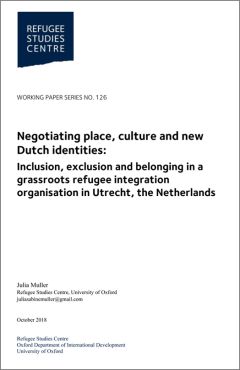Negotiating place, culture and new Dutch identities: Inclusion, exclusion and belonging in a grassroots refugee integration organisation in Utrecht, the Netherlands
Julia Muller

Charles Taylor in his work on interculturalism points out that in order to redefine nations that embrace diversity, we need a story. This paper aims to offer a particular story of refugee integration in the Netherlands through the example of De Voorkamer, a grassroots initiative located in Lombok, one of the most ethnically diverse neighbourhoods in the city of Utrecht. The initiative aims to enhance the integration of refugees and asylum seekers in ways that counter ‘bureaucratic processes of integration’. In light of growing Islamophobia, the rise of right-wing populism and increasingly restrictive immigration politics across Europe, stories of inclusion, integration and belonging in cultural diversity are needed to a growing extent. An intercultural narrative may present new perspectives, filling a gap in both theories and practices of refugee integration. After a detailed outline of the research methodology, a short description of the research context and the construction of a theoretical framework, three chapters present the analytical body of the research. The first discusses how De Voorkamer has become ‘a special kind of place’. It examines particular notions of belonging, considering practices of home-making and intercultural co-creation. Guided by De Voorkamer’s practices and self-identifications, the second chapter explores discourses of multiculturalism and interculturalism, analysing the binary of ‘local’ and ‘newcomer’ through terminologies of sameness and difference. Finally, the third chapter looks at different levels of engagement among locals and newcomers, investigating to what extent instances of inclusion and exclusion inform feelings of belonging. Ultimately, this research aims to demonstrate whether and how De Voorkamer – in the words of Charles Taylor – fosters integration, combats stereotypes and encourages exchange, and thereby offers insights into what successful refugee integration, in the Netherlands and beyond, might entail.
